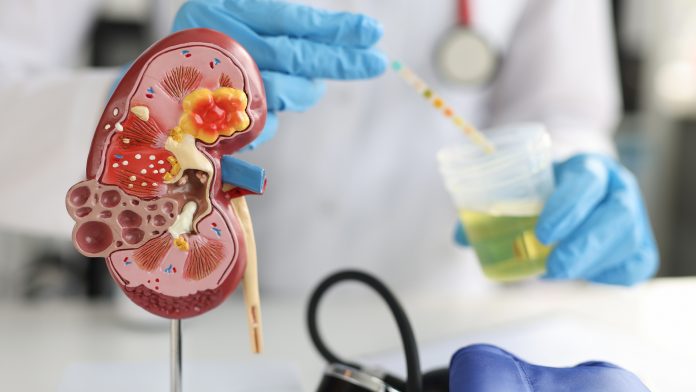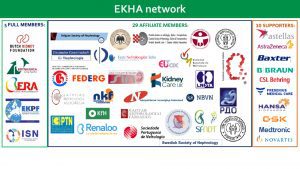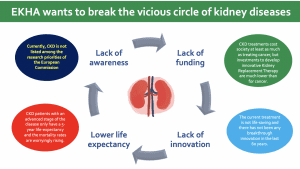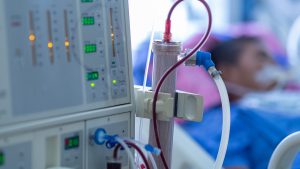
Raymond Vanholder and Eveline Scheres from the European Kidney Health Alliance highlight where further efforts are needed to improve the prevention and care of kidney diseases.
EKHA is a Brussels-based European Nephrology advocacy platform in which a broad scope of organisations and individuals of the Nephrology community work together for healthy kidneys and the benefit of people with kidney diseases. EKHA is supported by the 23 Members of the European Parliament (MEP) Group for Kidney Health.
As a health non-governmental organisation (NGO), EKHA defends the case of patients with kidney diseases and all those involved in kidney care at the EU and national levels. EKHA’s mission is to diminish the number of people who develop Chronic Kidney Diseases (CKD), to slow down the progression of CKD and to improve the quality of life for CKD patients. EKHA advocates for the preservation of kidney health and sustainable kidney care, i.e. optimal kidney health and care at reasonable costs.
What are the EKHA’s key goals?
The EKHA goals are:
- Prevent people from developing kidney diseases;
- Improve disease (self) management and therewith patients’ quality of life, by informing politicians, caregivers (GPs, specialists) and scientists on the impact of unhealthy kidneys;
- Push for better therapies for kidney patients that are accessible to all European patients;
- Include CKD as a research priority of the European Commission; and
- Improve accessibility to kidney transplantation, home hemodialysis and peritoneal dialysis.
EKHA currently represents five major European nephrology societies and 30 national or smaller European organisations (covering physicians, nurses and above all patients). EKHA is also a member and president of the European Chronic Disease Alliance (ECDA) and member of the European Alliance for Cardiac Health (EACH).

EKHA status January 2023
What are the key challenges regarding the prevention and diagnosis of CKD?
CKD remains for a long time asymptomatic although it is fatal: the risk of mortality (especially cardiovascular mortality) increases from the very start. CKD therefore is justly named the silent killer. As a consequence, people do not feel that they have kidney diseases. Therefore, timely detection is essential which can easily be accomplished by a simple blood test (serum creatinine to allow estimation of glomerular filtration rate – a measure of the filtering capacity of the kidneys) and urine test (albuminuria – a measure of the integrity of the kidney filter).
Unfortunately, people are not aware of the importance of healthy kidneys and few individuals will ask their doctor how their kidney function is. Few countries have developed a systematic early screening programme for kidney dysfunction, in contrast with screening for other diseases, especially cancers (breast, colon), cardiovascular risk factors (cholesterol), and diabetes. The consequence is that we have only extrapolated figures of the real prevalence of kidney diseases, but we know from these estimations that CKD affects one in seven Europeans. Only, most of them do not know it. In addition, the mortality of kidney disease is extremely high and still rising. Kidney diseases are forecasted to be the fifth cause of death worldwide by 2040. Mortality will then exceed that of all cancers, diabetes, Alzheimer’s disease and traffic accidents.
Thus, what we need is a harmonised European screening programme for kidney diseases across EU Member States and EU-associated countries. This is essential because the occurrence and progression of kidney diseases in many cases can be prevented by simple lifestyle measures (ban smoking, healthy food habits, exercise, blood pressure and body weight control) and if needed, drug therapy.
Can you describe the typical care pathway for someone suspected of having CKD?
The unfortunate thing is that most people learn they have kidney disease only when the disease has progressed to advanced and irreversible stages. In addition, many of them do not know how kidneys work or what their importance is. In this way, the announcement of the diagnosis comes as a surprise but affected patients also face difficulties understanding what happens and what needs to be done.
If the diagnosis comes in time, the appropriate therapy is started and if therapy is adhered to, the progression of the disease can be controlled or slowed down. However, the speed of progression differs from individual to individual, and interfering factors may affect progression, e.g. in case of complications that make blood pressure drop, intake of drugs or substances that are toxic to the kidneys or infectious diseases. Also, adherence to therapy is dismal in many patients, in part due to a lack of awareness and information even by other specialists than nephrologists and general practitioners. As the disease progresses most people are prone to developing complications (especially cardiovascular disease – kidney diseases are a similarly important cardiovascular risk factor as diabetes). Patients often need to be hospitalised, follow a strict diet, and take many drugs, and along with this, experience a range of symptoms including a lack of appetite, fatigue, itching, pain, sensory disturbances, and difficulties concentrating.

In advanced stages, it may become necessary to replace the sick kidneys with dialysis or transplantation but these are only partial solutions and do not restore life or outcomes to normal. As the most frequently applied kidney replacement option (haemodialysis) needs to be done every other day for several hours and necessitates a connection to electricity and water supply, it is difficult for patients on dialysis to live a normal professional and social life or to travel, while they suffer from numerous side effects of the treatment like fatigue, itching and becoming extra vulnerable for other (infectious) diseases. These consequences do not only affect the patient but also their family and surroundings. Children suffer retardation in their development and dialysis makes them lose precious time for their education.
What progress has been made in the last decade with regard to new drugs, diagnostics, devices, and care models available for CKD?
We have seen progress in many areas, i.e. around awareness of kidney diseases, treatment of risk factors such as hypertension and diabetes, new drugs to refrain the progression of specific kidney diseases or kidney diseases at large, and better immunosuppression to prevent rejection of transplanted kidneys. The advent of novel antidiabetic drugs has appeared efficient in preserving kidney function better than earlier treatment options, irrespective of anti-diabetic effects. They also mitigate complications such as heart failure and cardiovascular events. In this way, for the first time since the development of the inhibitors of renin-angiotensin axis, we do have an additional weapon to slow down kidney dysfunction. But this is not enough. Not all people who are treated this way show a successful reaction and for many specific kidney diseases, there is no directed therapy, in contrast to other conditions like many specific cancers. Also, biomarker development to accelerate detection and guide treatment has been more successful in other areas like cancer or cardiovascular disease. Finally, although there were a number of corrections on details, the basic principles of dialysis have remained the same since its clinical inception in 1943. In contrast to most other technological innovations (telecommunication, computers), dialysis missed the train of innovation, resulting in few improvements, no miniaturisation, and a lack of user-friendliness.
Are there any notable developments or current issues in CKD research or treatment which you would like to highlight?
Metabolic and functional alterations
As cardiovascular risk is the major cause of morbidity and mortality, and since kidney dysfunction causes a plethora of metabolic changes and retention of substances that damage the heart and vessels, unravelling those mechanisms and developing therapies to neutralise these mechanisms will help to decrease cardiovascular risk in kidney diseases and likely also in the general population. A substantial part of these metabolic changes are related to molecules produced by the intestinal metabolism and its bacterial content (the microbiome); clarifying those mechanisms and developing specific therapies to prevent those changes (probiotics, prebiotics, symbiotics – or drugs) will be essential to refrain those metabolic changes.

To make dialysis more environment-friendly and at the same time more comfortable and flexible, we need more compact dialysis systems that would consume less water and make dialysis less dependent on specific places
Functional alterations
Much of the damage to vessels, heart and kidneys is the consequence of fibrosis (scarring of tissues) but for the time being no real therapeutic solution has been found to cope with fibrosis. The development of efficient anti-fibrotic therapies will be a major step forward. CKD is a condition of accelerated ageing (senescence) and also this process is linked to fibrosis; therapeutic solutions against senescence (senolytics) are a potential solution to control progression and complications.
Rare kidney diseases
There is an urgent need for additional solutions against the progression of kidney insufficiency for many specific kidney diseases, especially for the so-called orphan (rare) kidney diseases (affecting less than one in two thousand people) which is in sharp contrast with many other orphan diseases (e.g. neurodegenerative or musculoskeletal diseases, cancers).
Environmental aspects
Climate changes and environmental factors (e.g. pollution) affect the kidneys and this problem necessitates more know-how and better solutions.
Kidney replacement therapies
At the same time, kidney care and especially dialysis is a major environmental threat (water and plastic waste, greenhouse gas emission – 500 litres of water waste and greenhouse gas emission equivalent to a 240km car ride per dialysis – more than 300,000 Europeans dialysing 150 times per year). To make dialysis more environment-friendly and at the same time more comfortable and flexible, we need more compact dialysis systems that would consume less water and make dialysis less dependent on specific places. Moreover, more efficient prevention and transplantation will decrease the number of people on dialysis. Regenerative medicine (the use of living cells as therapy: stem cell technologies and bio-artificial organs or supplementation of artificial organ systems like haemodialysis with cells to increase performance) may help to find specific therapeutic solutions or to supplement existing therapies.
Societal aspects
Another challenge is to make all this innovation socially sound, i.e. budget-friendly; in this context health-economic analysis needs more attention. Likewise, many people do not have access to optimal care (minorities, poverty, health illiteracy) but awareness campaigns often address educated and well-off people while therapies are often developed for wealthy countries. Hence, correcting those societal injustices is another major challenge for the years to come.
Policy aspects
Last but not least, currently CKD is not listed among the research priorities of the European Commission. EKHA, therefore, wants to engage EU policymakers to lower the socioeconomic burden of CKD by creating awareness and urgency on CKD being a neglected disease at all stages. To reach these aims, EKHA interacts with the European Commission and the members of the European Parliament.
This article is from issue 25 of Health Europa Quarterly. Click here to get your free subscription today.









